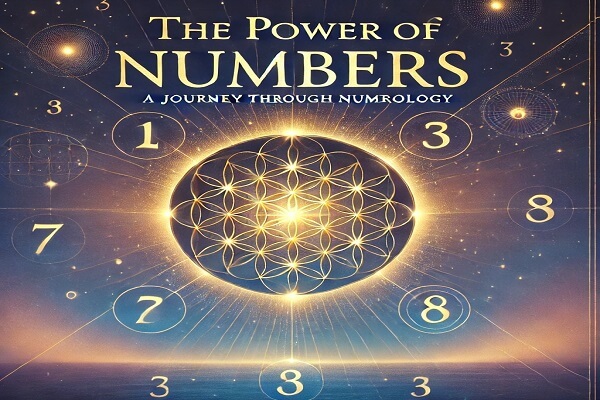Introduction to Numerology

Numerology is an ancient metaphysical science that delves into the mystical relationship between numbers and events in the universe. It is based on the idea that the universe is governed by a system of vibrational energies, which can be expressed and understood through numbers. These numbers are not just abstract symbols but are thought to carry deep, hidden meanings that can offer insights into one’s personality, life path, and even the course of human history.
The Origins of Numerology
The origins of numerology can be traced back thousands of years. Ancient civilizations like the Egyptians, the Babylonians, and the Chinese all used numerology to make decisions and understand the world around them. However, it was in Ancient Greece, through the teachings of the philosopher Pythagoras, that numerology became more structured and formalized. Pythagoras, a mathematician and mystic, is often credited with developing the first system of numerology, which became the foundation for the system we use today.
Numerology was not limited to the Greeks alone. The mystical Jewish tradition of Kabbalah also incorporated numerology, particularly through the study of the Hebrew alphabet and its associated numbers. Similarly, in Chinese culture, numerology is deeply intertwined with the concepts of Feng Shui, the I Ching, and astrology, where the influence of numbers plays a key role in harmonizing one’s environment and life path.
What Is Numerology?
At its core, numerology is the belief that numbers have specific meanings and vibrations that influence the events and experiences of our lives. It is the study of how numbers relate to our physical, emotional, and spiritual well-being. Unlike traditional mathematics, which deals with numbers in a logical and quantitative sense, numerology interprets numbers as symbols of deeper cosmic forces.
For example, the number 1 is often associated with leadership and independence, while the number 2 resonates with balance and cooperation. Through numerology, individuals can better understand themselves and their place in the world, gaining insight into their strengths, weaknesses, and challenges.
The Key Elements of Numerology
Numerology operates on the idea that each number corresponds to a certain frequency or vibration, which can influence human experiences. There are several key numbers in numerology that are essential for understanding how this system works:
- Life Path Number: This is perhaps the most important number in numerology, as it reveals your true self and your life purpose. It is derived from your birth date and represents the lessons you are meant to learn during this lifetime.
- Expression/Destiny Number: Calculated from your full birth name, this number reveals the talents, challenges, and natural abilities you possess.
- Soul Urge Number: Also known as the Heart’s Desire Number, it is derived from the vowels in your full birth name and reveals your innermost desires and motivations.
- Personality Number: This number is calculated from the consonants in your birth name and indicates how others perceive you.
The Role of Numerology in Different Cultures
Throughout history, numerology has been embraced by a wide variety of cultures, each using numbers to unlock hidden truths about existence. In Egypt, the ancient priests studied the significance of numbers to understand divine laws. In Greece, Pythagoras used numerology to understand the spiritual dimensions of reality, believing that the universe itself was built upon numerical harmony and ratios.
In the East, particularly in China, numerology plays a central role in the philosophy of Feng Shui and the I Ching. The Chinese have long believed in the auspicious and inauspicious qualities of certain numbers, with the number 8 being considered particularly lucky, while the number 4 is associated with bad luck due to its pronunciation (similar to the word for "death" in Mandarin).
Modern-Day Numerology
In modern times, numerology has seen a resurgence as people seek to understand themselves and their life paths on a deeper level. While it is often viewed as a form of spiritual guidance or self-help tool, numerology can be applied in practical ways to improve one’s life, from choosing a career to understanding relationships. It provides a framework for personal growth by revealing the inherent strengths and weaknesses of individuals based on their numbers.
Why Study Numerology?
Numerology offers valuable insight into human nature and the world around us. By understanding the vibrations and energies that numbers represent, individuals can make more informed decisions about their lives. Whether you are trying to uncover your purpose, improve your relationships, or navigate a difficult time, numerology can help you gain clarity and perspective. The practice is not about predicting the future, but rather understanding the influence of numbers and how they can align with your personal journey.
Through numerology, you can gain a greater understanding of yourself, your relationships, and the world at large. This powerful tool is a way to align with the universe’s natural order, helping you live a more fulfilling and balanced life. The insights provided by numerology can help guide your path and empower you to make more intentional choices that are in harmony with your highest potential.
Conclusion
Numerology is not just a mystical practice; it is a tool for self-discovery and personal growth. By exploring the meanings and influences of numbers, we can unlock the mysteries of the universe and gain deeper insight into the events, people, and opportunities that shape our lives. Whether you are a skeptic or a believer, numerology has the potential to reveal patterns and truths that are hidden in plain sight, offering guidance and wisdom for those who seek it.

